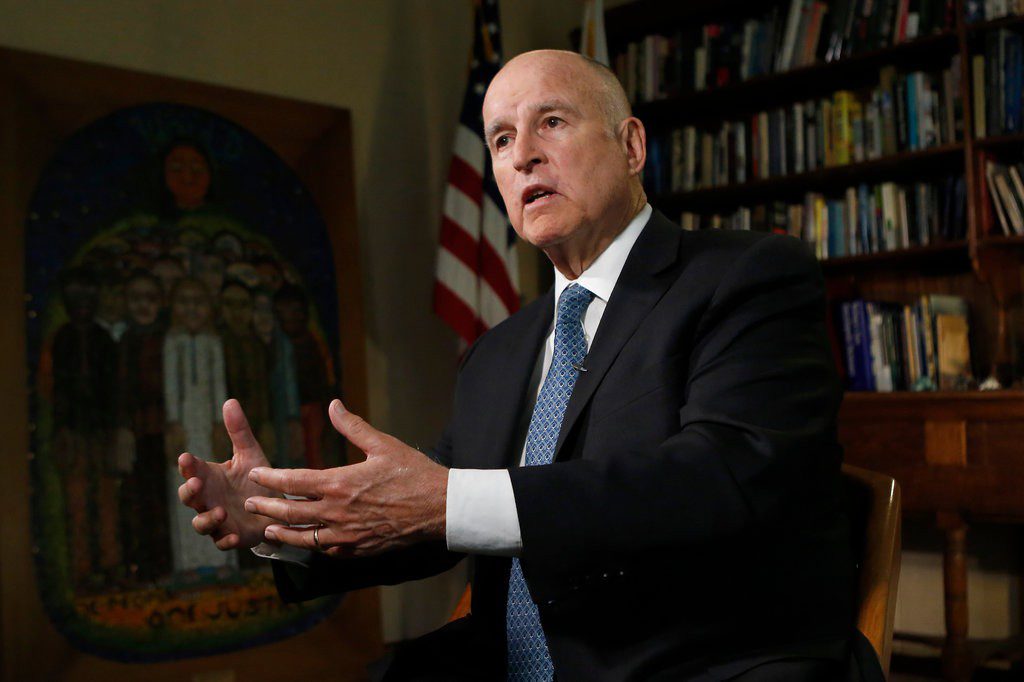
Gov. Jerry Brown of California has been a forceful opponent to many of President Trump’s actions, including immigration and environmental deregulation.
How so very different, smarter, cleaner, more just, and well balanced, the country would be if more of it were like California.
By Cecilia Kang, Via NYTimes, Sept. 30, 2018
WASHINGTON — The Justice Department on Sunday sued California to stop the state’s new law that would guarantee full and equal access to the internet, a principle known as net neutrality, in the latest legal fight between the state and the Trump administration.
The suit was filed shortly after Gov. Jerry Brown signed the net neutrality bill. The law is one of the strongest efforts in the nation to restore internet access rules since they were rolled back by the Federal Communications Commission last year. Governor Brown, a Democrat, has been a forceful opponent of many of the president’s actions, including on immigration and environmental deregulation.
Attorney General Jeff Sessions said that California’s net neutrality law was illegal because Congress granted the federal government, through the F.C.C., the sole authority to create rules for broadband internet providers.
“States do not regulate interstate commerce — the federal government does,” Mr. Sessions said in a statement. “Once again the California legislature has enacted an extreme and illegal state law attempting to frustrate federal policy.”
The California law positioned the state as a standard-bearer for internet regulation, and it follows the creation of an internet privacy law in June. Like California’s auto emissions laws that forced automakers to adopt the standards for all production, the state’s new net neutrality rules could push broadband providers to apply the same rules to other states.
Xavier Becerra, California’s attorney general, said the state would defend its new law.
California “will not allow a handful of power brokers to dictate sources for information or the speed at which websites load,” Mr. Becerra said. “We remain deeply committed to protecting freedom of expression, innovation and fairness.
The Justice Department suit was filed in the United States District Court for the Eastern District of California.
The debate over net neutrality has created a crowded legal battlefield. Mr. Becerra is also among 20 state attorneys general filing suit against the federal rollback of rules. Many broadband providers are expected to sue states that enact new rules, including California.
California’s net neutrality law prohibits telecommunications companies like AT&T and Comcast from blocking or slowing down the delivery of internet traffic to broadband customers. The law goes further than the rules that the Trump administration eliminated, by also prohibiting promotions known as zero rating, that give unlimited streaming of certain sites for free but charge for others.
The law is meant to protect consumers from attempts by telecom companies to charge extra or suppress access for some websites. The legislation is also intended to protect start-ups that could not compete with bigger websites that team with telecom companies for greater exposure to internet users.
State Senator Scott Wiener, an author of the state bill, defended the law after the Justice Department lawsuit was announced.
“In their world, no one is allowed to protect an open internet,” he said. “We’ve been down this road before: when Trump and Sessions sued California and claimed we lacked the power to protect immigrants. California fought Trump and Sessions on their immigration lawsuit — California won — and California will fight this lawsuit as well.”
The F.C.C. passed net neutrality rules in 2015 with the support of President Barack Obama. But the F.C.C. chairman under President Trump, Ajit Pai, has argued that the rules aren’t needed, saying that there aren’t enough examples of harm to justify rules on broadband providers. Some promotions, like zero rating, in which a company like Verizon may offer free streaming of Hulu but not Netflix, could be good for consumers, he said.
“The internet is free and open today, and it will continue to be under the light-touch protections,” Mr. Pai said in a statement supporting the Justice Department lawsuit.
Since the F.C.C. dismantled federal net neutrality rules last December, four states, including California, passed their own net neutrality laws. The F.C.C. has argued that the states are not allowed to create new rules. But state legislators and consumer groups have said they are prepared to fight any lawsuits.
“When the F.C.C. chose to ignore the millions of consumers who urged them not to repeal net neutrality protections last year, it left a void that state lawmakers are now rightly filling,” said Jonathan Schwantes, senior policy counsel for Consumers Union.
Mr. Schwantes said the California law was particularly significant. “Thanks to its market power and influence as the country’s largest state,” he said, “California’s law sends a strong message to internet service providers and has the potential to shape the market across the country.”
The California law was expected to set off lawsuits by telecom companies, which say strict rules would increase their costs. They argue that state laws create a difficult regulatory patchwork across the nation.
Those suits could still arrive, even with the Justice Department’s action.
US Telecom, a trade group representing big broadband providers such as Verizon and Charter, criticized the rules for creating separate rules for California and other states. The group did not reply to questions on immediate plans for a lawsuit but several industry officials say the state rules are likely to be challenged.
“Rather than 50 states stepping in with their own conflicting open internet solutions, we need Congress to step up with a national framework for the whole internet ecosystem and resolve this issue once and for all,” Jonathan Spalter, the president of USTelecom, said in a statement.
Katie Benner contributed reporting.